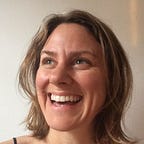Dana Mortenson, on the Future of Learning
Hi, I’m Dana, co-creator of: WorldSavvy. We work with schools and communities to ensure all young people are ready for our complex global future.
Home base: Minneapolis — via both coasts. I chose the middle.
10 years ago, I said: We need to convince people of the why. Why global competency matters. Why our K-12 system that was designed for the 19th and 20th centuries (to prepare our Industrial Era workforce) is failing us. Why 21st century skills like empathy and teamwork are critical, urgent.
Today, I say: It’s about the how because the why is understood. We know what to do to create inclusive, adaptive learning environments — and we can measure what matters. Our challenge now: how to make these environments the new norm, available everywhere. Our world is changing fast and our approach to education needs to keep pace.
Surprising facts: 1) By 2020, human knowledge will double every 12 hours, according to estimates; 2) 65% of the jobs that today’s grade schoolers will hold don’t exist yet; 3) Rural is changing faster than urban (map here). We see this through our school partners — e.g., in East Tennessee and Southeast Minnesota. This shift challenges what it means to be American—a refreshing question if we let it be.
A turning point: I was in grad school in New York when 9–11 happened. My best friend there was a Bangladeshi Muslim and she was impacted by a xenophobic backlash. So I saw at close range what happens when people act from a place of fear rather than openness. We started exploring what would happen if we looked at diversity as an asset — and at schools as communities that can model inclusion and trust.
Trends I’m tracking: Personalized learning that meets students where they are so they can be self-directed; virtual ways to track real-time learning and progress — e.g., micro-credentialing that allows teachers to demonstrate mastery of a competency; embedding design thinking across learning environments. All three are happening in pockets.
I’m energized by: Curious people, people who seek out new information and viewpoints. On the flip side, I’m anxious about polarization in our country — it’s accelerating so fast it has its own inertia. Why is this a problem? Because it shuts down curiousity and makes it hard to receive new information and perspectives. Staying open to difference is an act of bravery, especially in this climate. We need to re-establish that.
On my bookshelf: Robin DiAngelo’s White Fragility, Tara Westover’s Educated, An Indigenous People’s History of the United States by Roxanne Dunbar-Ortiz. And podcasts: Hidden Brain, Code Switch, anything that gets me thinking deeply about human behavior.
Changemakers who inspire me: My fellow Ashoka Fellows who show the dynamism and diversity of the country. For example, I just saw Amelia Franck Meyer, also in Minneapolis — she’s reforming our country’s child welfare system. Inspiring and important work!
Looking ahead: I’m excited to tell our story in new ways. I just signed on to write my first book about our work and the journey, so that’s a new frontier for me, and for 2020 I’m planning a podcast that will explore connection across difference and center the lived experiences of young people — how they see the world and the things they contribute.
Next up, I’m tagging: Hamse Warfa to tell us about the future of migration. He created BanQu and now leads employment and economic development for the state of Minnesota.
Read more about Dana here and watch her on PBS. Follow her on Twitter: @DLCMSavvy @WorldSavvy
Meet the country’s leading changemakers and see what they’re seeing…. you can follow the weekly series here. New post every Friday!
